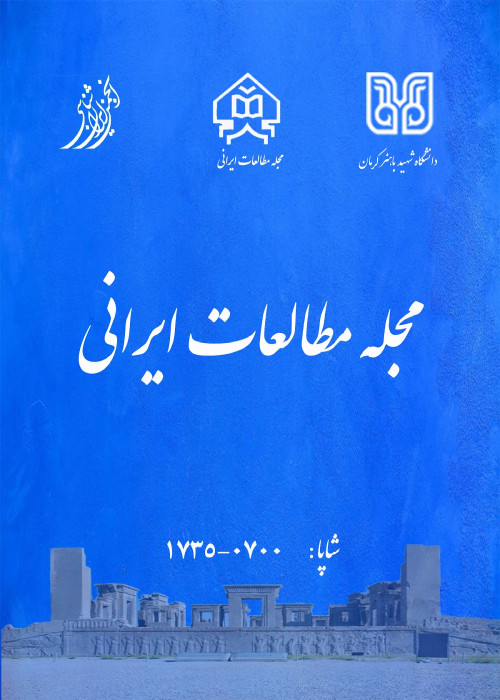Exchange and Reproduction of Political Discourse of Eighth A.H in Hafiz’s Divan
A work of art is the production of exchanges and interactions among creator, collective sources, simple and complex network of traditions, discourses and historical, social and political institutions. So, Hafiz’s Divan could be considered as an area for interactions and exchanges as well as discourses, traditions, political and social activities of Iranian society which transcends cultural and historical texts and boundaries with continuous dynamism. Modern historicism is a new approach in the study of historical and literary texts dating back to the second half of the nineteenth century. This neo-historicist approach is appropriate for the classical literary and historical works while it explains the various aspects and forms of collective sources, traditions and the system of domination in the reproduction of the system of power. To the extent that the creators are interacted with the political structure or system and power, they provide a clearer image of the complex layers and sources, traditions and the dominant historical and cultural discourses.Hafiz is a poet who interacts with authority and this issue can be traced in symbolic and general readings of his poems. Recognizing the relationship of the political discourses of the eighth century AH and Hafez's poetry as well as the exchanges, interactions and reproduction in his divan and the study of its aspect in his Divan, it is easy to understand the political discourses of the very period and to explain the role of these discourses in shaping the relationship between text and history meaning the effect and context of its production.
This study tends to examine social and political discourses of Hafiz’s era, interactions and reproductions of those discourses and the extent of its reinforcement and rejection in his Divan with a descriptive-analytic method using new historical approach.
One of the important issues of neo-historicism is the flow of discourses between the different texts. According to Foucault's point of view, any power system creates its own "truth regime", and the literary and cultural texts of any period are either influenced by this regime and consolidating it, or dream of changing it. In other words, either part of the "hegemonic" system is ruling or the other in opposition to it (Milani, 2001: 9). Hafiz had a huge interest in short and hasty period of Al-Inju's rule and its pleasant hegemony has extended the scope of ancient discourse of this dynasty to Hafez's poetry. Based on the ancient Iranian discourse of Al-Inju, Hafiz seeks for a wise and just king. Hafez's poetry does not concern with the asceticism and worship of the king, but what becomes relevant is the justice of the king. Hafiz showed special interest in the reproduction of the principles of the Abbasid Sharia-based discourse after the fall of Alainjo's government by Amir Mobarz al-Din Mozaffari (Shabankarei, 2002: 2/316). Hafiz was not happy about the assassination of his beloved Sultan, Shah Abu Ishaq, by Amirz Mobarez, as well as his strict actions in the matter of Sharia (Samarkandi, 1383: 293; Katabi, 1364: 64). As with the symbolic title of Muhtasib, which is a representation of the character of Amir Mobarez Mozaffari, Hafiz shows his opposition to his dogmatic discourse in various ways. With the death of Amir Mobaraz al-Din Mozaffari, the intensity of his Shari'a-like discourse was adjusted by his son Shah Shoja 'and his sons, and they adopted a gentle and tolerant policy in this very regard. In Hafez's divan, there are signs of modification of this matter based on the reproduction of the discourse of the brave king and his children. With the weakness and decline of the Mozaffari dynasty and the continuation of bloody conflicts and social and economic disorders, their Shari'a discourse also declined and the focus turned to the discourse of the new and powerful power emerging from Transoxiana and represented by a person named Timur Lang. Towards the end of his life, Hafez, in despair of reproducing Mozaffari's Shari'a discourses and the emerging Turkic discourse in establishing security, again, in a general and implicit way, expressed his desire to fulfill Khosravi's discourse.
Hafez's Divan welcomes the Khosravi and Iranian discourse of Al-Inju and strengthens its discourse foundations by using elements, concepts and symbolic historical and literary symbols. With the overthrow of Khosravani Al-Inju's discourse by Amir Mobarzaldin Mozaffari and the creation of his dogmatic discourse, Hafez's court rises to conflict and confront it by producing the symbolic element of the preacher in a network of negative associations. However, with the modification of Mozaffari's Shari'a's discourse by the sons of Amir Mubarz al-Din, that is, the brave Shah and his sons, a text is provided for the exchange and proximity of Mozaffari's Sharia's discourse and Khosravi's discourse, and its scope is extended to Hafez's court. Subsequently, with the weakening and decline of Mozaffari's discourse, this discourse provides the arena for the reproduction of the Turkish-oriented discourse represented by Timur Lang. Finally, with Hafez's despair at the end of his life from the Turkic discourse, in organizing the turbulent and unsettled situation of the time, his desire to revive Khosravi's discourse, which oversees Hafez's youth, is reproduced.
- حق عضویت دریافتی صرف حمایت از نشریات عضو و نگهداری، تکمیل و توسعه مگیران میشود.
- پرداخت حق اشتراک و دانلود مقالات اجازه بازنشر آن در سایر رسانههای چاپی و دیجیتال را به کاربر نمیدهد.



